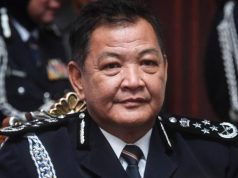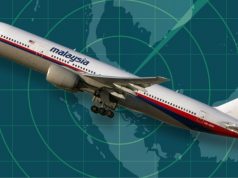Kuala Lumpur, March 20- Data logs of three flight “games” were found deleted from the home-made simulator belonging to Captain Zaharie Ahmad Shah, the pilot aboard missing Malaysian jetliner MH 370.
Police said forensic teams and international counterparts were trying to retrieve the missing logs from three flight simulation programmes – Flight Simulator X, Flight Simulator 9 and XFlight10, reported New Strait Times.
Malaysia’s defence minister Hishammuddin Hussein told a news conference on Wednesday that investigators are trying to retrieve the files. He also said that the pilot, Captain Zaharie Ahmad Shah, is innocent until proven guilty of any wrongdoing, reported Associated Press.
Hishammuddin said background checks have been received from overseas agencies for all foreign passengers on the plane except for those from Ukraine and Russia – which accounted for three passengers. He says none of the checks has turned up anything suspicious.
Relatives grow frustrated as no trace of Malaysian plane found
Relatives of passengers on the missing Malaysian airliner grew increasingly frustrated on Wednesday over the search’s lack of progress as planes sweeping across vast expanses of the Indian Ocean and satellites peering on Central Asia turned up no new clues in the hunt.
Malaysian authorities examined new radar data from Thailand that could potentially give clues on how to retrace the course of the plane that vanished early on March 8 with 239 people aboard en route from Kuala Lumpur to Beijing. Twenty-six countries are looking for the aircraft as relatives anxiously await news.
“It’s really too much. I don’t know why it is taking so long for so many people to find the plane. It’s 12 days,” Subaramaniam Gurusamy, 60, said in an interview from his home on the outskirts of Kuala Lumpur. His 34-year-old son Pushpanathan Subramaniam was on the flight heading to Beijing for a work trip.
“He’s the one son I have,” Subaramaniam said.
Two Chinese relatives of passengers held up a banner and started shouting at a hotel near Kuala Lumpur’s airport where officials were set to hold a briefing on the search. Police escorted them from the venue.
Investigators have identified two giant arcs of territory spanning the possible positions of Malaysia Airlines Flight 370 about 7 1/2 hours after takeoff, based on its last faint signal to a satellite. Cmdr. William Marks, a spokesman for the U.S. Navy’s 7th Fleet, said finding the plane was like trying to locate a few people somewhere between New York and California.
Aircraft from Australia, the U.S. and New Zealand on Wednesday scoured a search area stretching across 305,000 square kilometers (117,000 square miles) of the Indian Ocean, about 2,600 kilometers (1,600 miles) southwest of Perth, on Australia’s west coast.
Merchant ships were also asked to look for any trace of the plane. Nothing has been found, the Australian Maritime Safety Authority said.
China has said it was reviewing radar data and deployed 21 satellites to search the northern corridor of the search area stretching as far as Kazakhstan. Those searches so far have turned up no trace of the plane, Chinese Foreign Ministry spokesman Hong Lei said Wednesday.
Early in the search, Malaysian officials said they suspected the plane backtracked toward the Strait of Malacca, off western Malaysia. But it took a week for them to confirm Malaysian military radar data suggesting that route.
Thai military officials said on Tuesday their own radar showed an unidentified plane, possibly Flight 370, flying toward the strait minutes after the Malaysian jet’s transponder signal was lost. Air force spokesman Air Vice Marshal Montol Suchookorn said the Thai military doesn’t know whether the plane it detected was Flight 370.
Investigators now will be checking previous Malaysian military radar data against the Thai data to see if they can confirm locations for the plane and possibly a direction it was heading in order to narrow the search area, aviation safety experts said.
The two sets of data have to be “overlayed” to confirm that the hits, or targets, are recording the same plane or that it is indeed a plane and not a flock of birds or even a rainstorm. To do that, investigators need to determine that both radars were looking at the same place in the sky at exactly the same time down to the second.
Because the plane’s transponder had been turned off, the hits don’t contain identification, location or altitude. Both radars were recording what’s known as a primary return – essentially a radar signal bouncing of an object in the sky and returning.
“All you see is a little dot moving across the screen,” said Rory Kay, a U.S. airline training captain and former Air Line Pilots Association safety committee chairman.
Malaysia has said the loss of communications and change in the aircraft’s course are consistent with a deliberate diversion of the plane, whether it was the pilots or others aboard who were responsible. Police are considering the possibility of hijacking, sabotage, terrorism or issues related to the mental health of the pilots or anyone else on board, but have yet to say what they have uncovered.
Malaysia Airlines CEO Ahmad Jauhari Yahya said some sort of problem aboard the plane was not out of the question, although he noted the plane was intact enough to send a signal to a satellite for several hours. Observers have noted that some sort of distress signal would have been likely in the event of a cockpit fire.
As further confirmation that someone was guiding the plane after it disappeared from civilian radar, airline pilots and aviation safety experts said an onboard computer called the flight management system would have to be deliberately programmed in order to follow the route taken by the plane as described by Malaysian authorities.
“If you are going to fly the airplane to a waypoint that is not a straight… route to Beijing, and you were going to command the flight management computer and the autopilot system, you really have to know how to fly the airplane,” said John Gadzinski, a U.S. Boeing 737 captain.
Investigators have asked security agencies in countries with passengers on board to check their backgrounds, but no suspicious findings have been announced.
-Indiatoday











